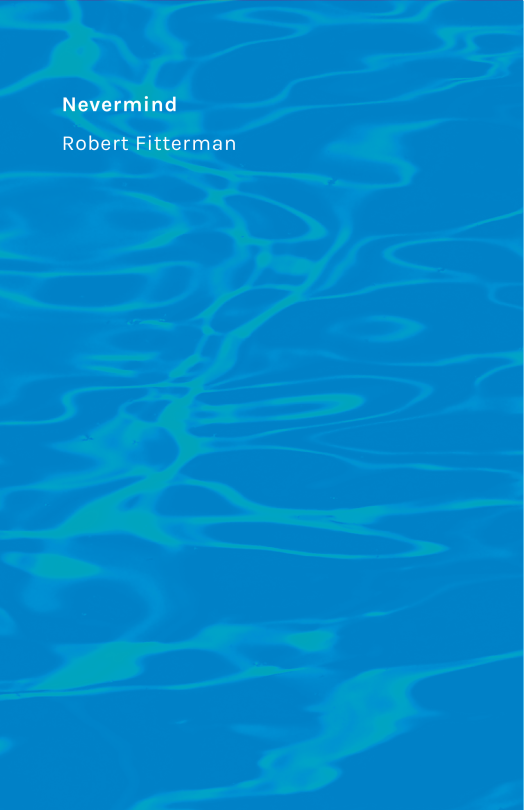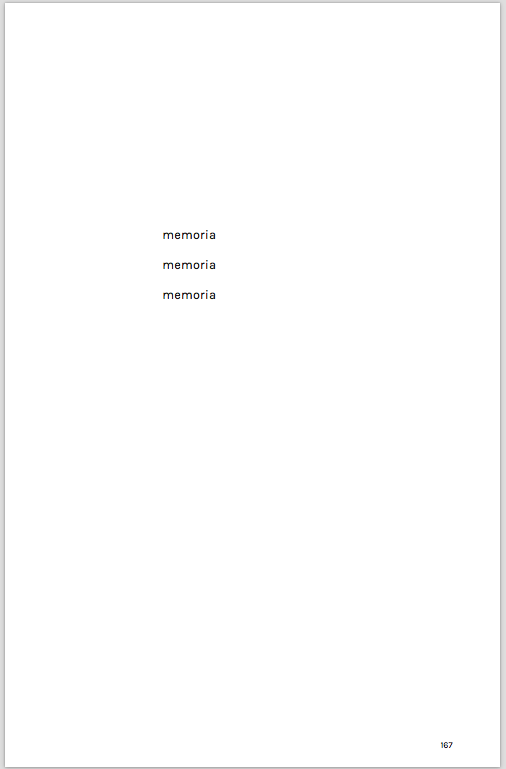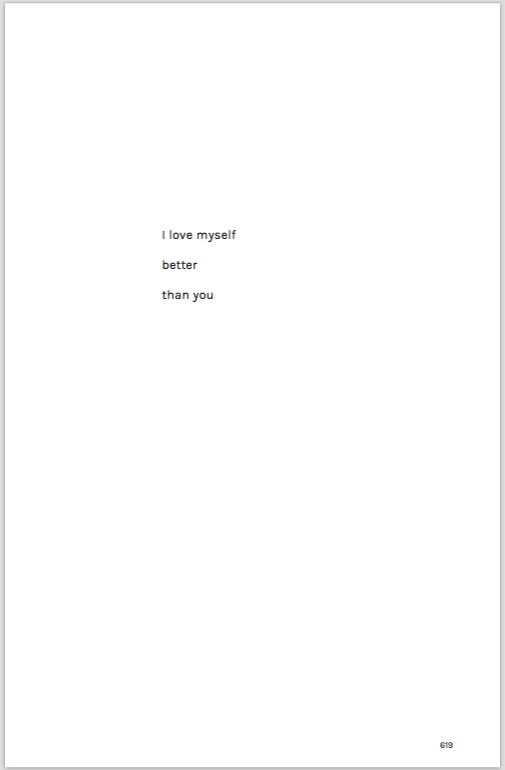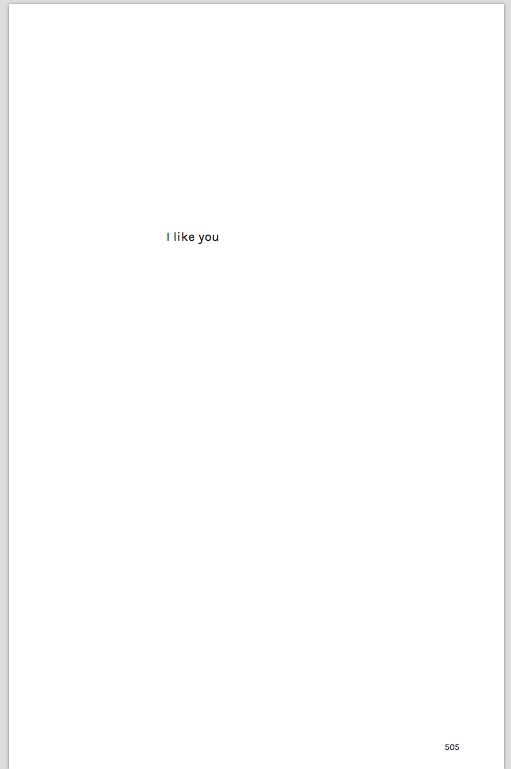
The Author Interviews Paul Stephens
For this interview, critic and scholar Paul Stephens forced Robert Fitterman to listen to Nirvana’s Nevermind on CD. Fitterman claims to have no strong feelings about the band—which might seem strange, because by the time the two sat down to listen to the CD, Fitterman had already repurposed Nevermind, every word in order as heard, into a 712-page minimalist poem of the same name (Wonder Books 2016). In part because Stephens knows too much about Nirvana, and in part because the two felt frustrated with the usual interview style, they decided to switch roles. In what follows, the author, Robert Fitterman, interviews the reader, Paul Stephens.
ROBERT FITTERMAN: What did you initially make of this book? What was your experience reading it?
PAUL STEPHENS: I wasn’t sure how you intended it to be read or how you would perform it. When it arrived in the mail, I skimmed through it, and decided I would try an experiment: I went to my local record store, bought a used copy of Nevermind on CD, and read the entire book in a single sitting while trying to keep my page turning in sync with the album.
RF: What was that like? It’s very different from how I perform the text. I like to use a stack of paper rather than read from the book, which makes for a very slow reading, but also draws attention to the physical nature of the object.
PS: I found the experience extremely disconcerting—a bit like karaoke on speed. You have to turn the pages at a dizzying pace to keep up with the music. The lyrics are burned into my brain, and yet I’d never looked at them on the page. I thought I could compare the book to the lyrics inside the CD, but as you know, the album wasn’t released with lyrics. Even though I could often anticipate what I would find on the next page, I was surprised at the violence of the lyrics—which I had tuned out after hearing the songs on popular radio so many times over the years.
RF: For you, Nevermind was an important album. It was released in a rite-of-passage teenage moment for you, the album loomed large on the early 90s psychic landscape. What did you make of my choice of it as a source text?
PS: I don’t think I had listened to Nevermind all the way through since it came out. In high school, I had seen Nirvana open for Sonic Youth before they signed to Geffen, and Kurt seemed like a god to me. For a long time I heard, “I’m a skater/ trying to be you,” when Kurt was actually singing “a mulatto, an albino”—and that kind of sums up my relation to Kurt before Nevermind. I couldn’t afford the CD, so I bought Nevermind on cassette the day it came it out, but within a month Nirvana was so omnipresent that I don’t think I ever listened to it again. I never bought another Nirvana album, nor did I follow the band, but I do remember being pretty bummed out by Kurt’s death.
RF: I love that misheard lyric—it’s not even close! For the last several years, I have had it in my mind to do a big minimalist poem—the scale was important. I carried around that idea without a subject for a long time, sort of like having the tune without the lyrics. I was attracted to this idea because I was thinking about the status of the poetry book, as object, in digital culture. I wanted to choose a subject that I could be somewhat indifferent to so as to avoid homage, on one end, or parody on the other. And then one day, a Nirvana song popped up in my shuffle and I worked backwards. But you have a much longer and deeper relationship to this subject. You grew up in a moment-slash-culture where Nevermind was already a go-to guide to a teen’s dark passage. You’ve revisited this dark passage since, and you’ve even mentioned the term “Kurtsploitation.” How do you see my version of Nevermind as “Kurtsploitation”?
PS: My wife and I came up with “Kurtsploitation” while watching Montage of Heck. The string quartet version of “Smell Likes Teen Spirit” pretty much tells you what you need to know about the term. I don’t really think this is a work of Kurtsploitation, although I do wonder if it’s possible to be neutral when appropriating or reperforming work that is disturbing and highly personal. There are lots of allusions to guns and suicide in the lyrics, for instance. Also to being itchy, presumably due to heroin. There is of course a certain irony in slowing down the lyrics and reading them in a dry voice. Given how overplayed the music is, the lyrics have probably lost any impact they might have anyway.
RF: In the lyrics, there are really good moments and some really bad ones. I don’t feel indifferent to them, I’m too emotional for that kind of detachment. I feel-slash-felt indifferent towards the choice of subject. For instance, I never could have chosen Blonde on Blonde because I love it too much, I never could have chosen an Olivia Newton John album because it would mostly just register as detached and funny, but there would probably be some lyrics in there—slowed down—that I would have an emotional connection to. So, I guess what I’m saying is that I needed the subject initially to be neutral, so I could perform a sort of neo-minimalist treatment. But there’s this too: in pre-internet minimalist poetry, there is the accessibility of the simple language and then a sort of shadow vocabulary, another dimension that resonates with the discourse of minimalism. This layering might bring some readers to think of advertising, consumerism, space, radical poetic experimentation, etc. Do you find a “shadow” discourse in the choices made in Nevermind? How has that discourse shifted?
PS: As a critic, I’m always trying to reverse engineer the many variables that go into a work like this. As soon as I started thinking about the choices you made, I went down the rabbit hole of how the lyrics have been reproduced elsewhere, and I was fascinated by how much variation there is not only online, but also in print. The closest thing there might be to “authorized” lyrics were included with the cassette single for “Lithium,” which I ordered on Discogs. Those lyrics are squeezed onto about a 4” x 6” insert in tiny print, and they differ radically from yours semantically. I also looked at Cobain’s journals to see if it might be versions of the Nevermind lyrics there, which it turns out there are, and those versions too differ radically from what you’ve written, and from what I hear when I listen to the album.
RF: What would be a good example of that?
PS: I think my favorite example would be from pages 166-167. At this point, you’ve only gotten to the third track, “Come As You Are.” You transcribe a portion of the song as “memoria/ memoria/ memoria,” and it seemed odd to me that Kurt would have been using Latin, as I’d always heard the lyrics as “memory of/ memory of/ memory of.” So I went and cross-checked with the (according to Geffen Records) “complete lyrics to every song on Nevermind” in the “Lithium” insert, and it’s written “memoria,” but most of that sequence is missing. Then I went to Kurt’s journals and I found that he hand wrote three different spellings on a single page: “memoriah,” “memory,” and “memoria”! Media historians and philologists of the future will have their work cut out for them!

RF: Ha! I like that I got one out of three. That would be my baseball batting average and my average of correct answers on French exams. I arrived at the lyrics through several unofficial sources, mostly online, and through my own listening. I was interested in accuracy and not the pleasure of the misheard lyric, or mondegreen. Still, nearly all of these sources contradict each other at some point, and even the “official” lyrics from Nirvana differ from one platform to the next. I tried to use this inconsistency to my advantage by embracing a subjectivity of my own authorship. In other words, I liked the idea of doing the best I could do, but showing some traces of my subjective input because I had to. What do you think of this kind of subjective impurity or sloppiness?
PS: Hm, that’s a toughy. Unofficially, I’ve wondered if there’s a pure conceptualism that is entirely rule-bound and sticks with “unedited” appropriated text, and then also an impure conceptualism that permits a writer much more agency in the composition of the work. I’m not satisfied with that distinction, in part because many subjective choices go into any appropriation work—but also because I think texts are always historical and carry with them the residue of their composition and circulation. In the case of Nevermind, I think it’s a work that carries with it an enormous amount of cultural baggage, and as a literary historian I’m fascinated by how you deal with that. Or don’t deal with it.
RF: This is one of the characteristics of repurposing that I most appreciate: it never quite empties the cultural baggage, though it certainly brings in new baggage. Poets who have repurposed sacred religious texts or pre-modern historical texts serve as good examples here. I agree with you about the false bifurcation between pure and impure repurposing strategies, in that they both carry so many subjective choices that there’s plenty of authorship to go around. But, at the same time, in the “impure” strategy, the author points more directly at that subjectivity; in the more “pure” version, the author points away from that subjectivity in an effort to present less of a filter (which is a subjective choice too for sure).

PS: Indirectly, the book can’t help but engage Nevermind’s cultural impact. At the book launch, when you read “Smells Like Teen Spirit”—which took about fifteen minutes—I felt like I could anticipate every word before you read it. Nevermind is sometimes referred to as “the last rock album,” and I feel like your version taps into that zeitgeist. Those lyrics are mnemonically implanted into the brains of pretty much any white kid who came of age in the nineties.
RF: How do you think this book addresses the politics of borrowed culture, or open source culture? Does it address issues about ownership of culture—who gets what? What do you think Frances Bean would make of this?
PS: One objective measure of “ownership over culture” might be the estate Kurt left, which is estimated to be worth $450 million. Not bad for a working class kid from Aberdeen, Washington, who died at 27. Frances Bean is rumored to be worth $150 million, so she obviously has an interest in the legacy. Maybe she would consider this Kurtsploitation, but she’d probably also recognize that this project is basically a noncommercial undertaking, and she’d probably be into Wonder Press. Although you’ve just disavowed this as your intention, I think it’s also possible to read the book as an homage to Kurt as a lyricist and poet. You could read it as a work of “Kurtolatry” as well as a work of “Kurtsploitation.”
RF: I could imagine Nevermind finding its way into a booth at a Nirvana memorabilia convention, and that would be an entirely new, different context from what I had in mind, and that’s good! Is the book better or worse, though, knowing that each page was considered separately, orchestrated without procedure? I get asked a lot: how long did this book take you to write? It took about nine months. Is that too long? Too short? Does it matter?
PS: This might get back to the pure or impure conceptualism issue. You didn’t just cut and paste this book from online, nor did you stick to a strict procedure like, say, using only one word per page. I think your choices about pagination and line breaks say a lot about how you see (more so than hear) the lyrics as poetry. On the page, Kurt’s lyrics can often look oddly Steinian, for example the opening of “Breed”: “I don’t care/ I don’t care/ I don’t care…” The “Lithium” insert removes all of that repetition and the first line simply reads: “I don’t care if I’m old.” Hearing sung lyrics is very different from seeing words in minimal and concrete poetry—which is premised on being extraordinarily aware of the space of the page. You’ve made decisions not only regarding the transcription, but also the placement of every single word, and that does seem significant to me. And very different from what might be a purer conceptual work like Caroline Bergvall’s VIA, which by listing various versions of the first line of The Inferno shows how radically translations can drift from an “original.” In the case of Nevermind, there is no “pure” text to draw on, but that may be true of all texts: the ways in which they are transmitted and received inevitably shift over time, and it depends on who’s listening. What you heard as “load up / on guns/ bring your friends / it’s fun / to lose / and to / pretend,” Weird Al Yankovic turned into “What is this song all about? / Can’t figure the lyrics out / How do the words to it go?”
RF: And what about the scale of the book? How does the heft of the book, or the book as an object, influence your experience?
PS: All of the Nevermind lyrics could be squeezed onto a single page of the book in a tiny font. Isn’t it indulgent to print a 712-page book when the contents are already online? We’ve probably already answered that. I don’t think this project would work if it weren’t a hefty tome. Robert Smithson has a great quote—“size determines an object, but scale determines art”—that I think helps to explain why so many minimal artworks are so large. The scale of the book gives you a lot of page space to maneuver within. You can isolate language on the page in ways that wouldn’t be possible otherwise. I love the last few pages, for instance. I don’t want to give away the ending, but it has something to do with death. In fact, you end with the so-called “Easter egg” hidden track “Endless Nameless,” which wasn’t included on the cassette I bought, or on the CD that I picked up recently. Will anyone besides me read every page of this book from cover to cover? Maybe not, but perhaps they will see the book—and Kurt’s lyrics—as the works of art that they truly are. But honestly all week I’ve been trying to get “Drain You” out of my head. And I’d be happy if I never had to hear “Smells Like Teen Spirit” ever again.





